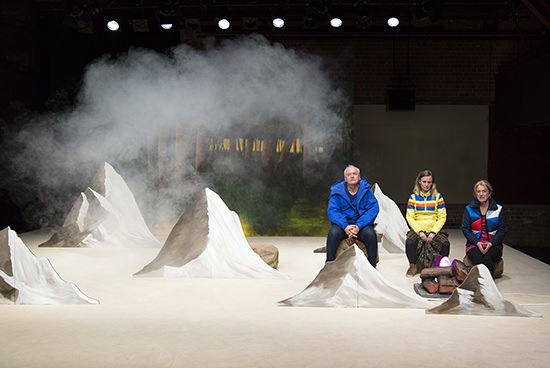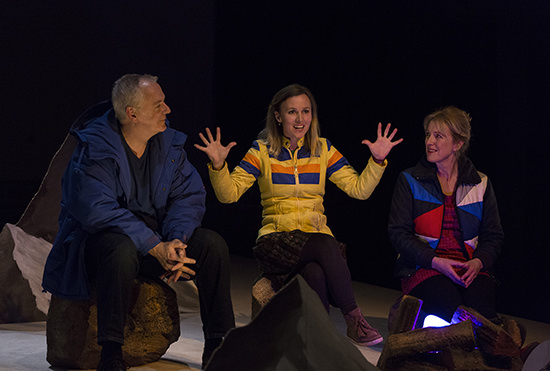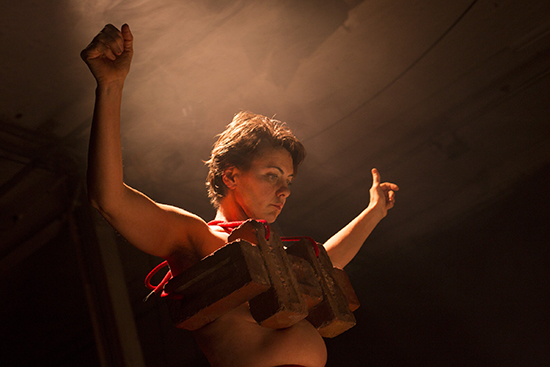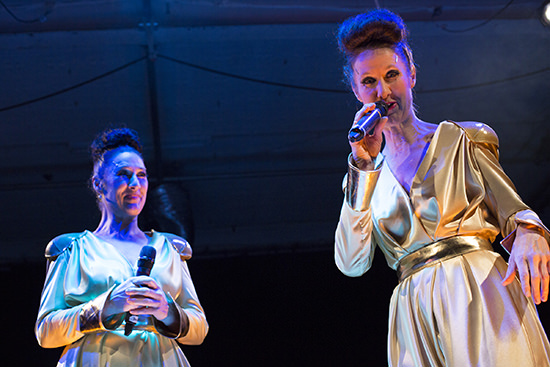Angles on eccentricity
John Bailey: Ranters; Maude & Anni Davey

Come Away with Me to the End of the World, Ranters Theatre
Ranters, Come Away with Me to the End of the World
There’s a sequence early in Ranters Theatre’s Come Away with Me to the End of the World in which an actor describes an unsettling meal she shared with a casual acquaintance. She finds her dining partner ordering stupid amounts of food, far too much for two people, and as the plates pile up they seem to suggest a crack, a glimpse into the dark interior of someone who is much more of a stranger than first thought. A fellow actor takes the story in, and then caps it off by stating that the teller sounds “eccentric.”
It’s a jarring moment, if typically played down by the company that could itself rank as one of the country’s most eccentric. The term—usually used affectionately—literally connotes being out of the centre, and Ranters has developed a singular theatre practice that eschews not just plot and character but conflict itself, which even the most avant garde theatre-makers generally still consider essential to works for the stage.
Come Away with Me to the End of the World will feel familiar to anyone with previous experience of the company’s work. Three performers occupy a fairly empty space, talking to each other in brief grabs about mundane experiences—anecdotes, memories, things they’ve read or heard, things they like or dislike. Occasionally they will launch into shared song or do some dancing, but these aren’t the transcendent moments of release you might find in musical theatre. No narrative as such is served up, and each audience member is left to decide individually what, if anything, ties any of this together, or why they should care. Despite the company’s lofty profile both locally and abroad, none of this can be said to position Ranters at the ‘centre’ of contemporary theatre practice.

Come Away with Me to the End of the World, Ranters Theatre
What is the centre through which Come Away with Me invokes the term ‘eccentric’, then? There’s a perhaps accidental motif of geographical distance that recurs throughout the work. Grottos and mountains and volcanos are referenced, as are real and imaginative flights to Iceland, Japan, Greece, France, Italy and Everest. Goats and wine crop up, perhaps hinting at the ecstatic realm of Pan, while the compulsive frenzies that have been associated with Tarantella dancers hover around the margins too.
Perhaps it is the self that is the problem here, and running throughout the work is the at times desperate desire to escape the oppressive confines of what in quainter times was called the ego. Though nearly everything here is delivered with the faintly beatific and at times almost smug half-smile that the company’s performers tend to project, there are tiny moments in which the facade seems like a death mask, as the words that emerge conjure instances of human frailty, mortality, paranoia and a sense of existential anxiety.
The people on stage here are profoundly incapable of exceeding themselves, and while they frequently speak of far-off places and extremes of living, it is almost always in relation to themselves. We are, of course, all bound by the same limitations, but this is a work that steadfastly refuses to offer promise of escape, even painting a depressing picture of theatre as just so many cruddy props to distract and allay our fears.
The most common and most kitsch resolution would be if Ranters implied that the one chance of escaping the self could be through sharing moments with others, finding some more authentic mode of communication that could aspire beyond the individual. That’s denied here, too. There’s no synthesis, in the end, no barriers hurdled or crisis averted. It just sort of ends. Because as nice as it might be to believe we’re all in this difficult existence together, what could be a real moment of human connection is just as likely to end with someone written off as eccentric.
Maude & Anni Davey, Retro Futurismus
Anni & Maude Davey, Retro Futurismus
Anni and Maude Davey’s Retro Futurismus is a work that inverts the notion of eccentricity by abolishing any sense of the normal. It’s the second incarnation of the project, bringing together a range of artists from various disciplines to produce a new kind of variety show based around the future as it was imagined by people in the past. Think Grace Jones, 2001: A Space Odyssey, 50s SF movies and 80s fashion.
It could be mere nostalgia or empty spectacle, so the most remarkable thing about Retro Futurismus is how often it produces genuine emotional responses. Physical performer Teresa Blake, in particular, produces a suite of acts both visually arresting and strangely impactful. Clad in a bikini made of real bricks, she plays a cello like an electric guitar. Appearing enmeshed in a wooden chair, as if a teleport has gone wrong, she attempts to dress herself as if life can go on as usual. Animating a tiny, infant-like ghost, she tries to find audience members able to provide it solace.
There are many equally compelling moments elsewhere in the piece but it’s often hard, if not impossible, to determine who is performing. A tentacle creature made from flexible air-conditioning ducting telescopes and contracts across the stage; rabbit-headed hula dancers refuse to hula dance; a blob-thing strains and groans its way across the space while shitting yet more bricks.
By looking backwards to see how others once looked forward, Retro Futurismus produces a kind of double vision in which hope and regret overlap. There’s great glee and energy in the romance of science fictions gone by, but also a painful realisation that this hope was let down by the reality in which we now find ourselves. Retro Futurismus doesn’t treat the past as merely eccentric, a dress-up box or playlist to get misty-eyed over, but it does act as a reminder that we can never go back, even to those who directed their dreams forward.

Teresa Blake, Retro Futurismus
–
Come Away With Me to the End of the World, director Adriano Cortese, text Heather Bolton, Beth Buchanan, Adriano Cortese, Raimondo Cortese, Patrick Moffatt, design Callum Morton, sound design David Franzke, lighting Govin Ruben, costumes Belinda Hellier, choreography Jo Lloyd, musical direction Evan Lawson, performers Heather Bolton, Beth Buchanan, Patrick Moffatt, Rosa Voto, Alessandra Barone, Natasha Colangelo, Tania Dionisio, Lucia Gareffa, Vincenzo De Simone, Joseph Sirianni, Ourania Vassis; Malthouse Theatre, 7-24 July; Retro Futurismus: New World, creators Anni and Maude Davey, performers Anna Lumb, Gabi Barton,Teresa Blake, guests Azaria Universe, Kira Puru, Yana Alana, The Huxleys; 45 Downstairs, Melbourne, 7-31 July
RealTime issue #133 June-July 2016







